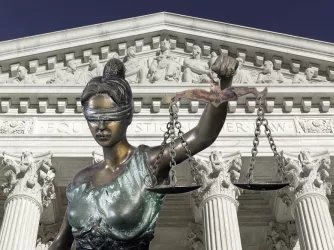Table of Contents
Don't Save the Date: NYT, WSJ, Fox, MSNBC, NPR Cover ‘Disinvitation Season’

The Class of 2014 is preparing for graduation by buying their caps and gowns—but let’s hope they weren’t counting on having a speaker for the ceremony. The years-long, snowballing trend of protests against commencement speakers, which FIRE has termed “disinvitation season,” is getting major attention this year from The New York Times, The Wall Street Journal, Fox News, MSNBC, and NPR, among many other outlets.
In the past few days, FIRE President Greg Lukianoff has appeared on Fox News and NPR to discuss the growing trend of students clamoring for the removal and silencing of famous figures like Ayaan Hirsi Ali, Condoleezza Rice, and Dustin Lance Black.
And the news keeps on coming. Over the weekend, Christine Lagarde, the International Monetary Fund’s managing director, stepped down as Smith College’s commencement speaker after nearly 500 people signed a petition demanding she be “reconsidered” as a speaker, claiming her work “directly contributes to many of the systems that we are taught to fight against.” FIRE’s Robert Shibley wrote about Lagarde’s withdrawal and Smith President Kathleen McCartney’s disapproval of students’ demands.
While Smith students refused to heed McCartney’s counsel, the problem has not escaped public notice, with major news outlets like The New York Times, The Wall Street Journal, and MSNBC raising questions about what this phenomenon says about the climate on campus.
Yesterday, The New York Times covered the controversy at Smith as well as McCartney’s response, and spoke to Greg about Lagarde’s decision to step down:
Her withdrawal comes after Condoleezza Rice, the former secretary of state, withdrew from speaking at the Rutgers University commencement in the face of protests against her role in Bush administration foreign policy, and weeks after Brandeis University rescinded its invitation to the rights advocate Ayaan Hirsi Ali to receive an honorary degree at its commencement, after protests over her anti-Islam statements.
Such reversals have become more common in recent years, said Greg Lukianoff, president of the Foundation for Individual Rights in Education, referring to this time of year as “disinvitation season.” What has changed is not so much the protests themselves, but the willingness of colleges and speakers to give in, adding that many apparently voluntary withdrawals are made at the college’s urging.
The Wall Street Journal, which said that Lagarde “joined an elite group—those whose plans to give commencement addresses this graduation season were derailed by student or faculty protests,” also spoke to Greg about the disinvitation trend on campus:
"I call it disinvitation season," said Greg Lukianoff, president of the Foundation for Individual Rights in Education, a free-speech advocacy group. "Not everyone gets disinvited, but there is such consistent effort to get rid of people."
Mr. Lukianoff said the trend is clearly growing. According to a tally by his group, between 1987 and 2008, there were 48 protests of planned speeches, not all for graduations, that led to 21 incidents of an invited guest not speaking. Since 2009 there have been 95 protests, resulting in 39 cancellations, according to Mr. Lukianoff's group.
The Journal further addressed disinvitation season’s long history on college campuses. While it’s a growing phenomenon, it’s not a new one.
Protesting commencement speakers isn't entirely new. In 1987, Jeane Kirkpatrick, a former U.S. ambassador to the United Nations, withdrew from delivering the commencement address at Lafayette College, where she also was to get an honorary degree. In 1993, then-Chairman of the Joint Chiefs of Staff Colin Powell weathered activists' ire and delivered Harvard University's graduation speech.
More recently, protests have greeted luminaries on the left, like playwright Tony Kushner, who faced protests at Brandeis in 2006 over his critical views of Israel, and 1960s activist Bill Ayers, who was disinvited from the University of Nebraska in 2008, according to the FIRE tally.
And in breaking news today, yet another commencement speaker has withdrawn under pressure. The Philadelphia Inquirer reports:
Robert J. Birgeneau, former chancellor of the University of California, Berkeley has backed out of speaking at Haverford College’s commencement scheduled for Sunday, following concerns expressed by Haverford students and several professors over his leadership during a 2011 incident when UC police used force on students protesting college costs.
FIRE will continue to keep you updated with the latest on disinvitation season.
Recent Articles
FIRE’s award-winning Newsdesk covers the free speech news you need to stay informed.

Supreme Court must halt unprecedented TikTok ban to allow review, FIRE argues in new brief to high court

Australia blocks social media for teens while UK mulls blasphemy ban

Free speech advocates converge to support FIRE’s ‘Let's Go Brandon’ federal court appeal
